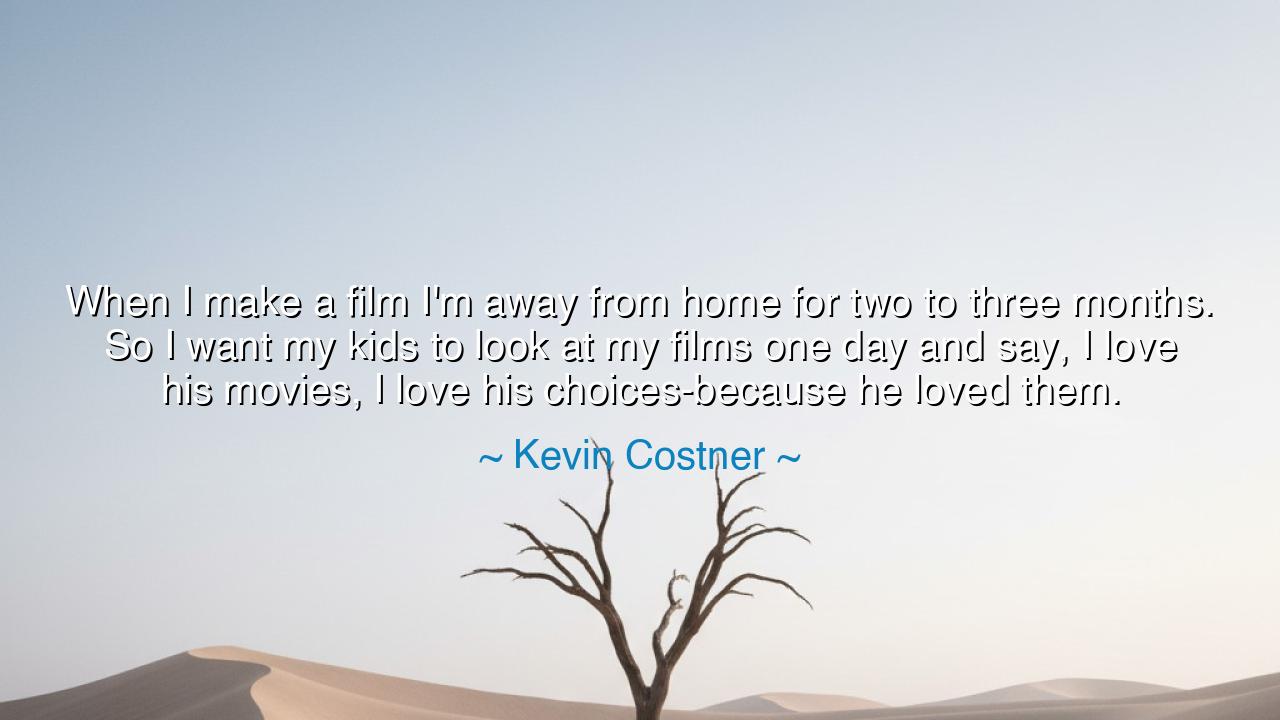
When I make a film I'm away from home for two to three months. So
When I make a film I'm away from home for two to three months. So I want my kids to look at my films one day and say, I love his movies, I love his choices-because he loved them.






When Kevin Costner said, “When I make a film I’m away from home for two to three months. So I want my kids to look at my films one day and say, I love his movies, I love his choices — because he loved them,” he was not merely speaking as an actor, but as a father, a creator, and a man who understands the price of passion. In those words lies the eternal struggle between duty and devotion, between the labor that sustains one’s legacy and the love that sustains one’s soul. Beneath his calm reflection is a universal truth: that our work, when done with love, becomes a gift to those who come after us — a testament of who we were and what we cherished most.
For Costner, the making of a film is not merely a profession, but a pilgrimage — a long journey away from home, a season of sacrifice. Each role he chooses, each story he tells, carries a piece of his heart, a reflection of the values he hopes to leave behind. He knows that absence has its cost, but he hopes that his children, when they look back, will see not the distance, but the devotion behind it. His films, he hopes, will not only entertain them, but teach them what he stood for — courage, justice, tenderness, and truth. In this way, his art becomes a kind of inheritance, a living monument built not of stone but of stories.
The ancients, too, spoke of this longing to leave behind a legacy of love. The Roman poet Virgil, in his great epic The Aeneid, tells of Aeneas, who journeys far from his home and loved ones to found a new nation. Though torn between duty and affection, Aeneas acts with the hope that his descendants will honor his purpose. So too does Costner walk this delicate path — a modern Aeneas, wandering far for the sake of creation, yet bound always by love for the family waiting at home. For both, the journey is not selfish; it is sacrificial, undertaken with the faith that one’s labors will one day be understood as love.
His words also remind us that true artistry is not separate from humanity; it springs from it. Costner’s films — tales of rugged landscapes, moral courage, and quiet strength — are reflections of a man striving to make sense of life, to find meaning in struggle and beauty in imperfection. When he says he hopes his children will love his choices because “he loved them,” he means that every creative act is an act of love — love for the story, love for the craft, love for truth itself. The artist’s duty, then, is not only to entertain but to reveal the depths of the human spirit, and to leave behind something that whispers, This was me. This was what I believed.
We see echoes of this in the life of Leonardo da Vinci, who often left his home and patrons for long stretches of wandering, consumed by his work. His notebooks and paintings — though scattered, unfinished, and sometimes misunderstood in his lifetime — later spoke for him across the centuries. Leonardo’s creations became his voice to the future, much as Costner’s films will one day speak to his children. This is the ancient bargain of the creator: to trade moments of presence for a legacy that endures beyond one’s days, trusting that love, when poured into one’s work, will find its way home.
But Costner’s reflection is not only about art; it is about intention. He reminds us that it is not enough to work hard or achieve greatness — we must work for something meaningful. We must infuse our choices, whether in art, business, or life, with the quiet fire of love. To make one’s choices from love — love for one’s family, one’s craft, one’s values — is to live rightly. For when the storms of time erase everything else, it is not success that remains, but the evidence of love: the footprints of a life lived with purpose.
The lesson, then, is clear and enduring: live so that your work becomes a reflection of your heart. Let your labor, whatever form it takes, be a message to those who follow you — a message that says, I was here, and I loved deeply. Like Kevin Costner, do not chase applause or recognition; chase meaning. Let your choices be guided by what you hold sacred. Build something your children, or the generations after you, can look upon and say, “They loved what they did — and through that love, they loved us.”
For this is the way of the ancients and the wise — to create not for glory, but for legacy; not to impress, but to endure. And when your days are done, may those who come after you look upon your life, as Costner hopes his children will upon his films, and say not merely, They were great at what they did, but, They loved with all their heart — and that love lives on.






AAdministratorAdministrator
Welcome, honored guests. Please leave a comment, we will respond soon